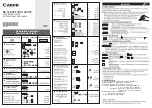
sumIf()
Catalog >
List
can be an expression, list, or matrix.
SumList
, if specified, must have the same
dimension(s) as
List
.
Criteria
can be:
•
A value, expression, or string. For
example,
34
accumulates only those
elements in
List
that simplify to the
value 34.
•
A Boolean expression containing the
symbol
?
as a placeholder for each
element. For example,
?<10
accumulates
only those elements in
List
that are less
than 10.
When a
List
element meets the
Criteria
,
the element is added to the accumulating
sum. If you include
sumList
, the
corresponding element from
sumList
is
added to the sum instead.
Within the Lists & Spreadsheet application,
you can use a range of cells in place of
List
and
sumList
.
Empty (void) elements are ignored. For
more information on empty elements, see
page 232.
Note:
See also
countIf()
, page 39.
sumSeq()
See
Σ
(),
system()
Catalog >
system(
Eqn1
[
,
Eqn2
[
,
Eqn3
[
,
...]]]
)
system(
Expr1
[
,
Expr2
[
,
Expr3
[
,
...]]]
)
Returns a system of equations, formatted
as a list. You can also create a system by
using a template.
Note:
See also
System of equations
, page 7.
Alphabetical Listing
177
Summary of Contents for TI-Nspire CAS
Page 4: ...4 Service and Warranty Information 249 Index 251 ...
Page 248: ...248 ...
Page 250: ...250 ...
















































